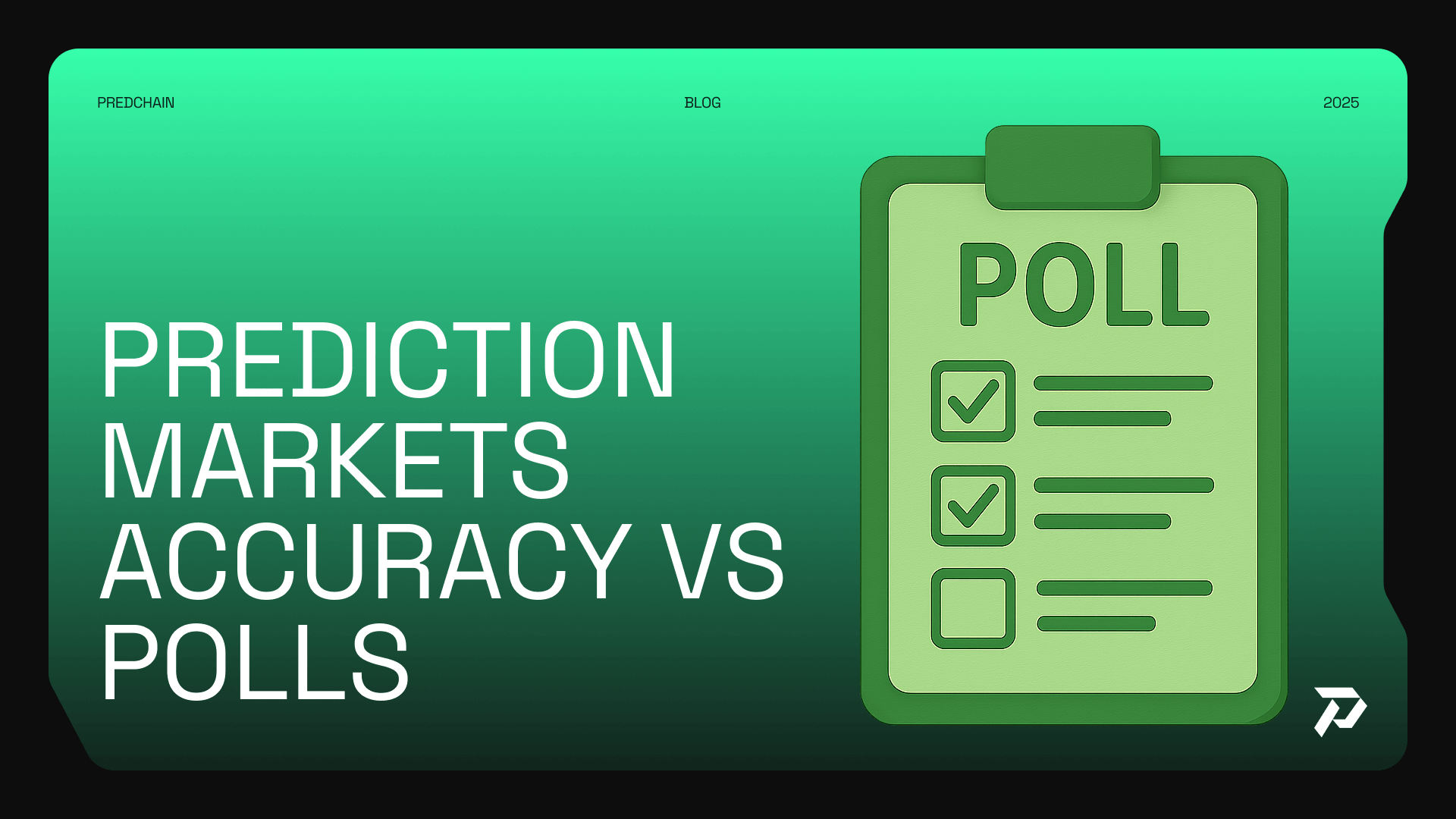Prediction Market Accuracy vs Polls and Expert Predictions

Quick Answer
Prediction markets leverage the wisdom of crowds by aggregating diverse opinions and financial incentives, which often makes them more accurate than traditional polls or expert predictions. Prices in these markets represent collective probability estimates, continuously updating in real-time as new information flows in, offering a dynamic and reliable forecast of future events.
Why Prediction Markets Are More Accurate Than Polls and Expert Forecasts
1. Strong Financial Incentives Drive Accuracy
Traders risk actual money when buying and selling shares tied to event outcomes. This financial stake motivates participants to:
- Research thoroughly
- Analyze data carefully
- Incorporate all available information
This reduces careless speculation and bias, unlike polls where respondents have no financial motivation to be correct.
2. Real-Time Continuous Updates Reflect Changing Information
Unlike periodic polls or one-off expert forecasts, prediction market prices adjust instantly to:
- Breaking news
- Market sentiment shifts
- Surprising developments
This allows prediction markets to capture evolving probabilities much faster than traditional methods.
3. Aggregation of Diverse Opinions Supports Robustness
Prediction markets pool many perspectives—from professional analysts to casual traders—which helps:
- Balance out individual errors
- Reduce personal biases
- Counter overconfidence present in any single expert forecast
The result is a more robust, reliable probability estimate.
4. Market Efficiency and Arbitrage Enforce Accurate Price Discovery
Arbitrageurs can exploit price discrepancies across platforms or similar markets, keeping prices close to true probabilities and enhancing overall accuracy.
Polls vs Prediction Markets: A Detailed Comparison
| Feature | Polls | Prediction Markets |
|---|---|---|
| Frequency | Periodic (days to weeks) | Continuous, real-time |
| Incentive | None for respondents | Real money risked by traders |
| Biases | Sampling errors, question design, response bias | Minimal due to financial stakes and active trading |
| Update Speed | Delayed, often retrospective | Instantaneous price adjustment |
| Accuracy | Good for static opinions, worse for fluctuating events | Typically higher for probabilistic forecasting |
Real-World Example: Prediction Markets vs Polls in Sports
Consider a major sports event:
- Polls: Team A shows a 52% chance to win, based on surveys or expert opinions collected over several days.
- Prediction Market: Team A trades at 60%, reflecting real-time factors like insider news, injuries, or lineup changes.
When a key player is injured hours before the game, prediction markets adjust immediately. Polls, however, cannot update so fast, making their predictions quickly outdated.
Expert Predictions vs Prediction Markets: What Sets Markets Apart?
Experts provide valuable insights, but:
- May have knowledge gaps or cognitive biases caused by overconfidence or anchoring.
- Sometimes rely on outdated or incomplete information, especially in fast-moving situations.
Prediction markets combine expert and non-expert views, weighted by financial commitment, harnessing collective intelligence.
Empirical studies repeatedly show that prediction markets either match or exceed the accuracy of expert forecasts, especially in complex or rapidly changing events like elections, financial markets, or geopolitics.
Leveraging Prediction Market Data: Practical Tips for Informed Decisions
- Use market prices as real-time probability indicators: Treat them as dynamic measures rather than static predictions.
- Cross-reference with polls and expert forecasts: Combining sources provides richer context and improves confidence.
- Watch liquidity and trade volume: Higher liquidity and active trading usually indicate more reliable price signals.
- Start trading on user-friendly platforms: Platforms like Predchain offer accessible entry points with minimal capital, helping beginners learn through practical experience.
Frequently Asked Questions
How accurate are prediction market prices?
Prediction markets are often more accurate than polls or expert forecasts because they aggregate information from many participants with strong incentives to predict correctly. Platforms like Predchain and Polymarket offer real-time probability updates as new information arrives.
Why are prediction markets better than polls for fast-moving events?
Prediction markets continuously update in real-time, reflecting breaking news, sentiment shifts, or unexpected developments, while polls are periodic and cannot capture rapid changes.
Can experts outperform prediction markets?
Experts can be valuable, but prediction markets combine multiple expert and non-expert views, weighted by financial commitment, often resulting in higher accuracy.
Do financial incentives improve prediction accuracy?
Yes, financial stakes motivate participants to research and make informed predictions, reducing bias and increasing accuracy compared to polls or casual opinions.
Are prediction markets useful outside finance or politics?
Absolutely. Prediction markets can provide valuable forecasts in sports, entertainment, technology adoption, weather events, and virtually any measurable outcome where participants have information and incentives.
What risks should users be aware of?
Low liquidity can lead to price volatility, and manipulation is possible in small or obscure markets. Always check platform rules and ensure sufficient trading activity before using market data for decisions.
Conclusion
Prediction markets provide a powerful, accurate, and continuously updating way to forecast future events by leveraging:
- Financial incentives
- Collective intelligence
- Market efficiency
While polls and expert predictions remain useful, integrating prediction market data offers a sharper, real-time edge for decision-making in sports, politics, finance, and beyond.
By understanding how to interpret market prices and combining insights across sources, traders, analysts, and enthusiasts can significantly improve their forecasts and strategic decisions.
Happy forecasting!